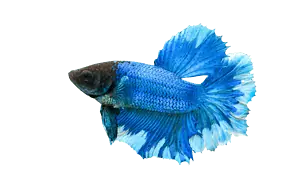A swollen belly on a betta means your fish suffers from bloating.
Sometimes, bloating only affects one side of a betta. This gives the fish a lopsided appearance and may cause difficulty swimming.
Constipation is the most common cause of bloat in betta fish. Other conditions leading to a bloated betta include:
- Overfeeding
- Swim bladder disorder
- Dropsy
- Bacterial/Parasitic infections
- Pregnancy
- Tumor
Minor issues in a bloated betta are curable with simple remedies. Severe cases of bloating in bettas are fatal without prompt treatment.
Seek help for your betta’s bloated belly when the first symptoms appear.
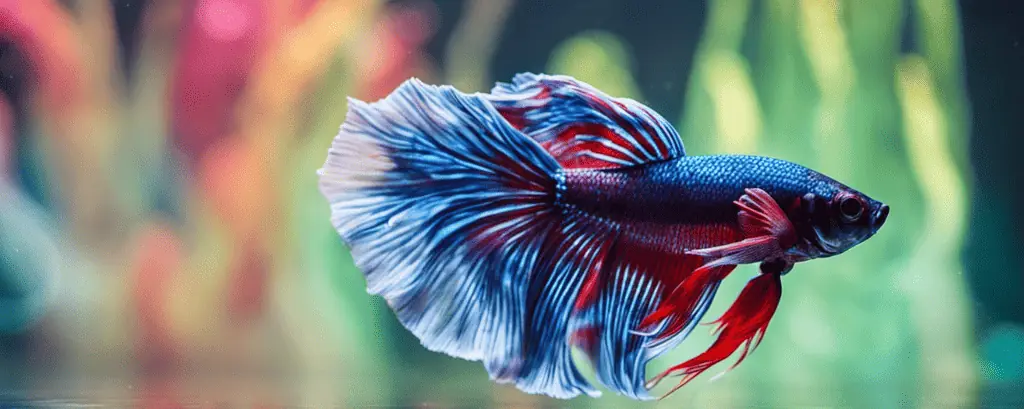
Table of Contents
Symptoms of Bloating in Betta Fish
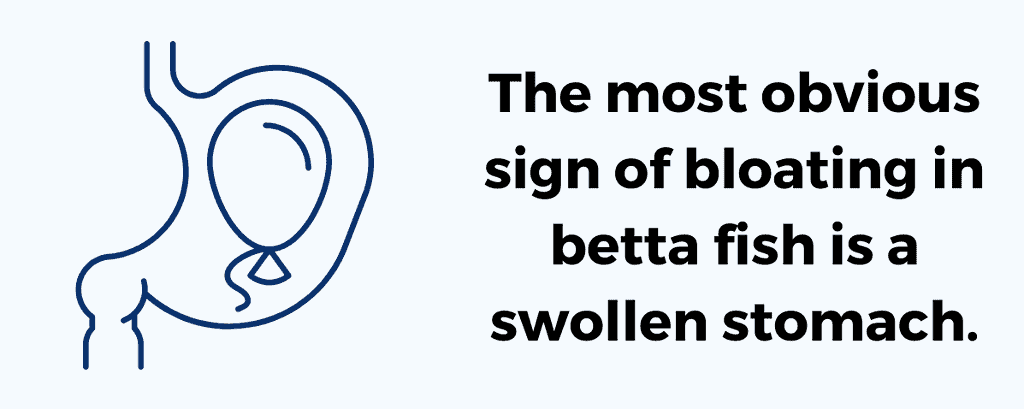
Bloated betta symptoms include visible signs and behavioral changes in the fish.
The most obvious sign of bloating in betta fish is a swollen stomach.
Your betta’s bloated abdomen may stick out more on one side.
This abnormal belly size makes swimming harder for a betta. As a result, the betta may swim in circles or stay at the bottom of the tank.
Betta fish occasionally swim to the surface and breathe air. If a betta is stuck at the bottom of the tank, it could be fatal for the fish.
Another symptom of bloat in betta fish is the inability to defecate. Since the betta is not releasing waste, it may stop eating.
Without proper nutrition, the betta becomes lethargic and stays in one place. The betta may be so malnourished it loses consciousness.
Do not ignore an enlarged belly in your betta fish. Prompt treatment increases your betta’s chance of survival.
7 Common Causes of Bloating in Betta Fish
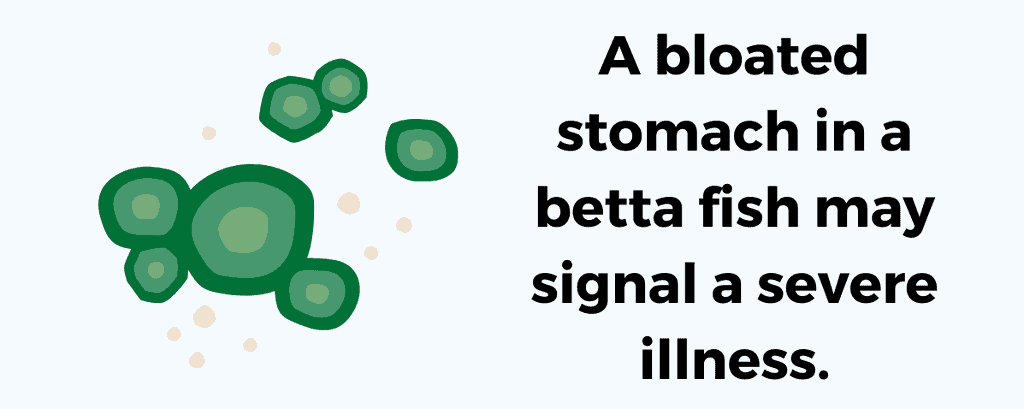
Bloating is not usually a big problem for humans. But a bloated stomach in a betta fish may signal a severe illness.
A distended belly is a secondary symptom of an underlying issue in a betta.
Several common health conditions cause a bloated stomach in betta fish. A betta’s diet and tank environment also contribute to bloat issues.
Understanding the causes of betta fish bloating helps determine the best treatment option.
1. Constipation
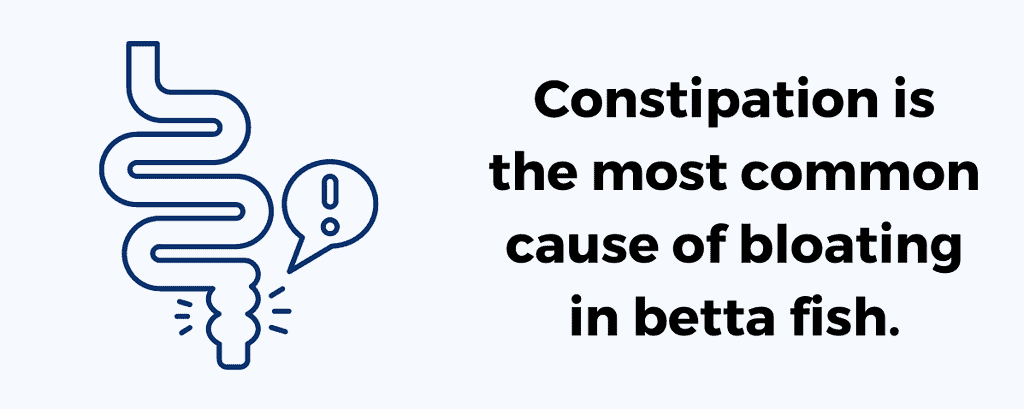
Constipation is the most common cause of bloating in betta fish.
Other signs of constipation in betta fish include:
- Lack of defecation
- Loss of appetite
- Lethargy
- Spitting out food*
*Check out all the reasons your betta is spitting out its food.
Constipation on its own is easily treatable. But it may also be a symptom of a more serious illness.
Most constipation-related issues stem from improper water parameters and poor diet.
Cool water temperatures cause slow digestion in bettas. Food builds up in the stomach, leading to bloating.
A poor diet also increases the risk of digestive issues. Low-quality betta food has a lot of fillers, which are hard for the fish to digest.
A constipated betta fish becomes sluggish and does not swim around as much. Lack of exercise complicates the constipation issue.
The betta may also become malnourished as a result of eating less.
2. Overfeeding
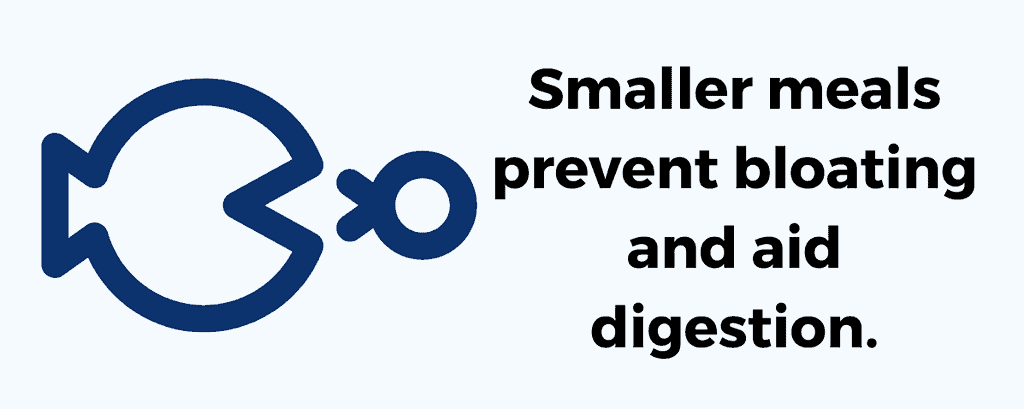
Betta fish are greedy eaters and gobble up whatever they can get. This behavior likely comes from natural instincts.
Wild bettas do not always have access to food and may go days without feeding. They eat whenever food is available for survival.
Captive bettas do not face food shortages and enjoy daily feedings.
Feeding your betta too much and too often causes bloating and constipation. Overfeeding also causes a build-up of toxins in the water and creates environmental stress.
You must determine the correct amount of food for your betta and stick to a regular feeding schedule.
Smaller meals spaced further apart allow for proper digestion and prevent bloating issues.
Avoid this issue by really digging into what betta fish need to eat in our article at the link.
3. Swim Bladder Disorder
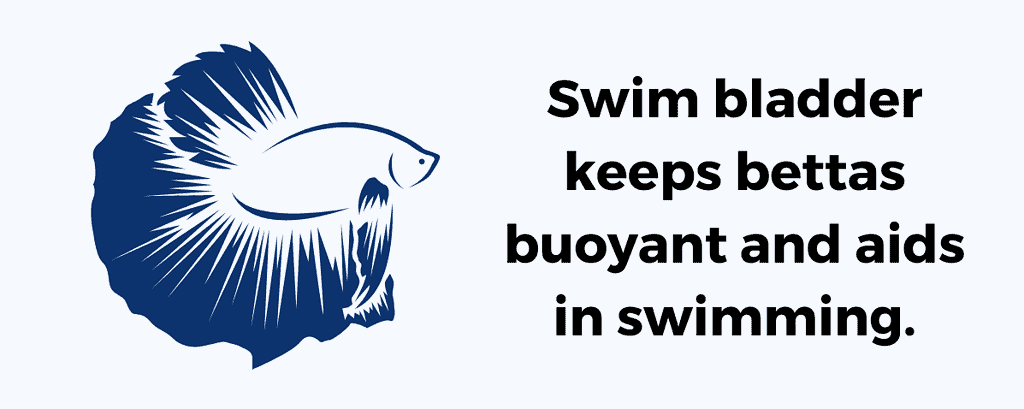
Betta fish have an organ called a swim bladder. The swim bladder keeps the betta buoyant and aids in swimming.
Swim bladder disorder is the second major cause of bloating in bettas.
Untreated constipation in bettas may lead to swim bladder disorder. Constipation may also be a secondary symptom of swim bladder disorder.
This may confuse new fish keepers diagnosing what is wrong with their betta.
Other causes of swim bladder disorder include:
- Injury
- Infection
- Temperature shock
- Swallowing air while eating
Besides bloating, there are behavioral changes in bettas with swim bladder disorder, such as:
- Staying near the surface
- Sinking to the bottom of the tank
- Swimming sideways
- Difficulty staying in one spot
Your betta may have trouble eating because it cannot swim to the surface.
Lethargic behavior is also common in swim bladder disorder.
Advanced stages of swim bladder disorder cause a curved spine in bettas. This happens because the swelling pushes other internal organs to the side.
The chances for survival are low when swim bladder disorder reaches this stage.
4. Dropsy
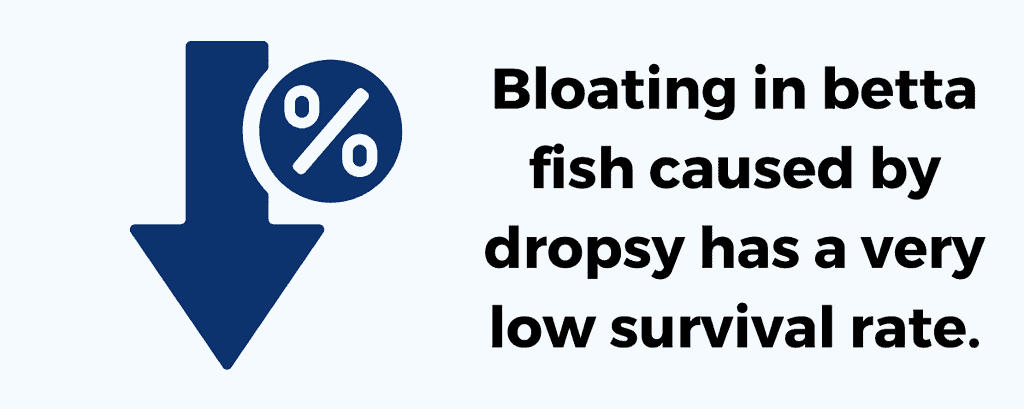
Bloating in betta fish caused by dropsy has a very low survival rate.
Dropsy is difficult to diagnose until the betta develops “pinecone” scales.
Pinecone scales are the result of damaged organs swelling in the body. As the organs swell, the bloating pushes the scales outward.
The spine may also develop a curve. When pinecone scales develop, the betta fish’s chances of survival are very low.
Causes of dropsy may include:
- Prolonged stress
- Poor water conditions
- Improper diet
- Internal injury
- Bacterial infections
Treatment options for dropsy are extremely limited. In most cases, the betta must be humanely euthanized.
5. Bacterial or Parasitic Infections
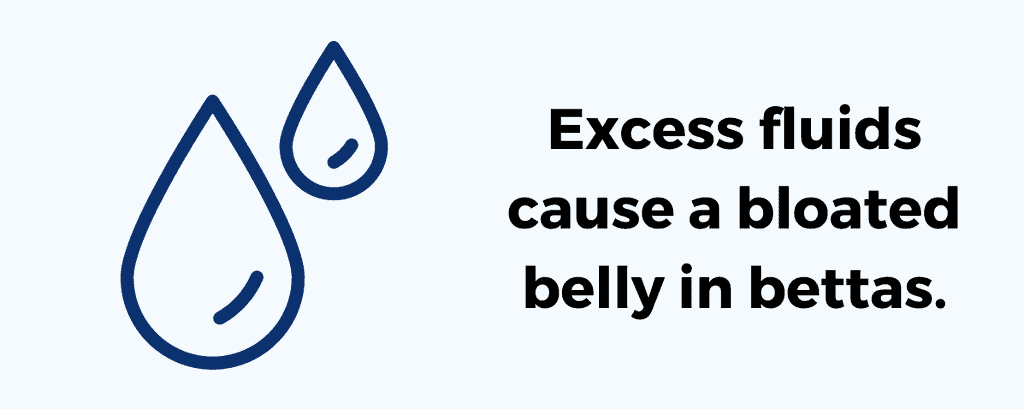
Bacterial and parasitic infections usually affect a betta’s kidneys. When the kidneys do not function properly, the excess fluids in the body cause a bloated belly.
Bacteria and parasites enter the aquarium in several ways, such as:
- Live plants
- Live food
- Poor water quality
- Other fish
Fungal infections also thrive in a dirty aquarium and may cause bloating in bettas.
Symptoms of infections usually include a lack of appetite and lethargy. Severe infections may also cause color loss in bettas.
Fortunately, several over-the-counter medications offer successful treatment for most infections. Your veterinarian may also prescribe stronger antibiotics.
6. Pregnancy

If you have a bloated female betta, she may be carrying eggs.
Female bettas develop eggs when they anticipate mating.
When the eggs are not fertilized, the female betta either absorbs or lays them anyway.
Besides bloating, there are a few other physical signs a female betta is pregnant.
You may notice white stripes along the length of the female’s body. A white dot is also visible on the female betta’s abdomen.
A pregnant betta is not a cause for concern unless she has symptoms of other bloating-related illnesses.
7. Tumor

Occasionally, a bloated betta belly is the result of a tumor.
Tumors in bettas are rare, and there is no way to prevent or cure them.
If you have ruled out all other causes of bloating in your betta, seek veterinary care for a confirmed tumor diagnosis.
Many tumors stay small and do not affect the betta’s quality of life.
When the tumor grows too large, the only solution is humanely euthanizing the fish.
6 Treatment Options for a Bloated Betta Fish
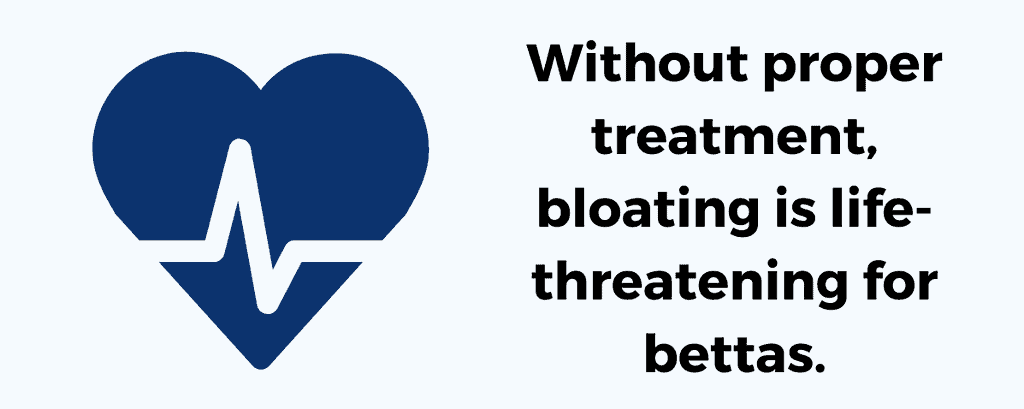
There are several ways of providing effective treatment for bloating in betta fish.
Before you begin treatment, you must diagnose the cause of bloating in your betta.
Many of these methods focus on relieving constipation, the leading cause of bloating.
Some treatments also cure minor diseases and infections.
Look for changes in your betta’s condition during treatment. If you do not see alleviation from symptoms, seek veterinary care.
Without proper treatment, bloating may be life-threatening for your betta.
1. Fast the Betta Fish for 1-2 Days
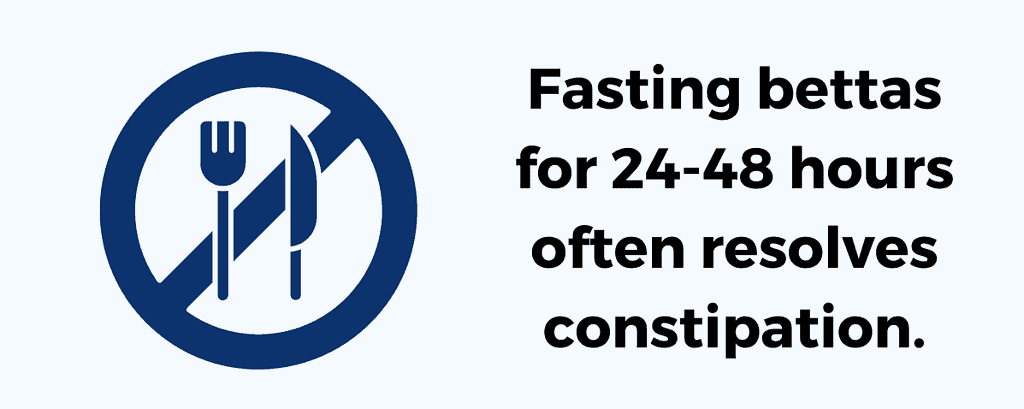
Fasting your betta for a couple of days allows for the digestion of any food in the stomach.
Feeding a constipated betta only adds to the problem.
Most cases of constipation resolve after 24-48 hours of fasting.
While bettas can survive without food for several days, fasting for more than three days is unhealthy.
If your betta does not have a bowel movement after fasting for 48 hours, offer some daphnia for a meal.
Daphnia is high in fiber and may get your betta’s digestive tract moving again.
2. Add Aquarium Salt to the Water
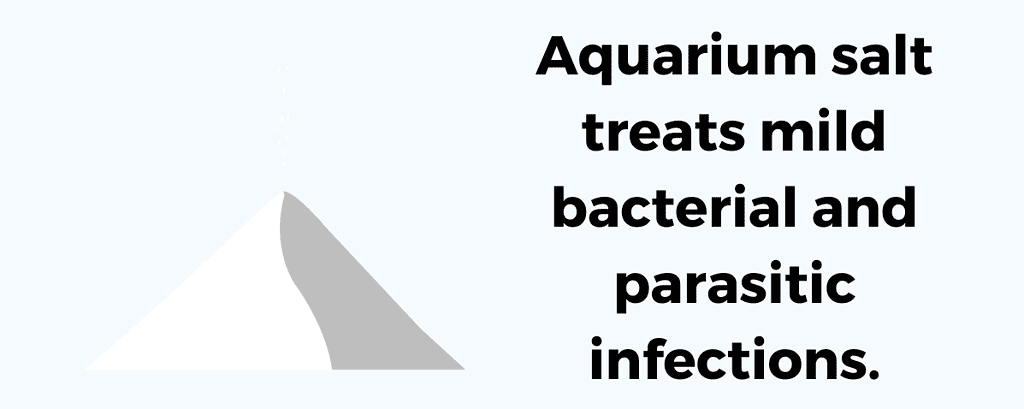
Aquarium salt is helpful in treating mild bacterial and parasitic infections. It also helps treat minor injuries and fin rot.
While aquarium salt does not help with bloating, it treats underlying issues like infections and injuries.
Do not use marine salt or table salt. These types of salt are harmful to bettas.
Using aquarium salt in your main tank could damage delicate plants and kill certain tank mates like snails and freshwater shrimp.
The salt also stays in your filter media, making removal difficult even with water changes.
How To Safely Treat Bloating With Aquarium Salt
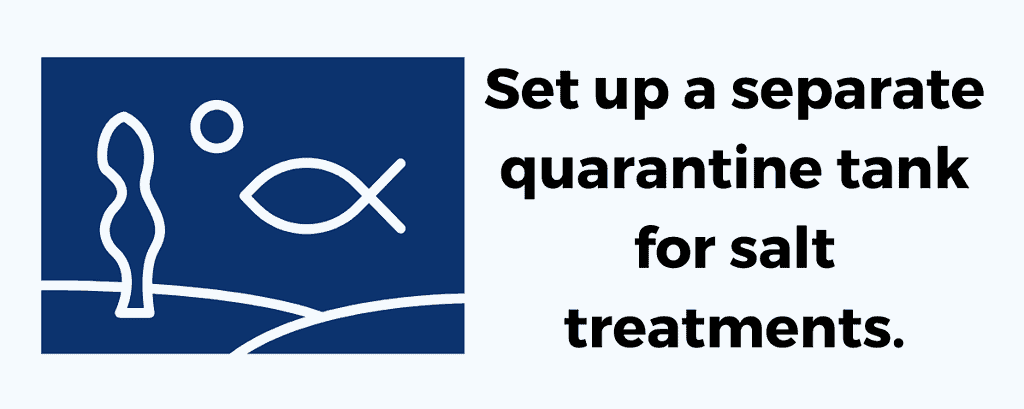
Avoid exposing the main tank by setting up a separate quarantine tank for salt treatments and other medications.
You need a second small container for acclimating your betta. This prevents the betta from going into shock after the change in environment.
Fill the first container with one gallon of aquarium water and one tablespoon of aquarium salt. Fill the second container with one gallon of aquarium water and 1/4 tablespoon of aquarium salt.
Ensure the water in both tanks is between 78-80° degrees Fahrenheit (25.5-27° C).
Carefully place your bloated betta in the first tank and let it swim for no more than 8 minutes. If your betta seems distressed at any point in this process, remove it immediately.
After 8 minutes, place your betta in the second tank for 2-3 minutes. This allows the betta to adjust to the lower salinity.
Once 2-3 minutes have passed, place your betta back in the main tank.
You may repeat this process once per day for up to five days.
3. Administer Epsom Salt
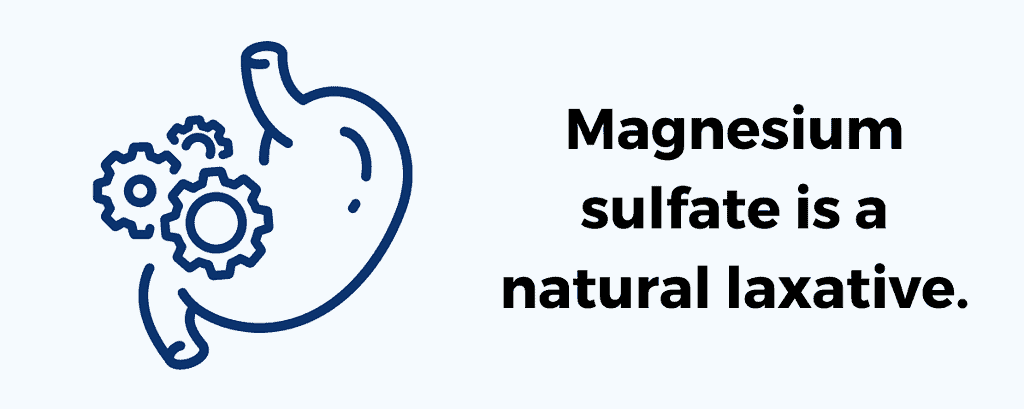
Magnesium sulfate, commonly known as Epsom salt, is a natural laxative.
An Epsom salt bath helps relieve a constipated betta. It also decreases the swelling caused by swim bladder disorder.
Epsom salt is usually preferred over aquarium salt for bloating issues.
Only use unscented and undyed Epsom salt.
Prepare an Epsom salt bath in the same way as an aquarium salt bath.
The recommended dosage is still one tablespoon per gallon of water.
Leave your betta in the Epsom salt bath for 10-15 minutes. Ten minutes is best for mild bloating, with a maximum of fifteen minutes for extreme cases.
Once again, check your betta for any signs of distress during the bath. Remove your betta at the first sign of discomfort.
Acclimate your betta in the second tank for 2-3 minutes before placing the fish back into the main tank.
Repeat the Epsom salt bath for up to five days.
4. Provide a Varied Diet

Some betta fish pellets do not have enough fiber content. They also swell in your betta’s stomach, sometimes causing constipation.
A bloated betta needs extra fiber in its diet.
Fiber-rich foods like mysis shrimp and daphnia help with bloating and add variety to your betta’s diet.
5. Add Probiotics to Water

Probiotics add beneficial bacteria to aquarium water. They boost your betta’s immune system and help with digestion.
Several betta foods now contain probiotics. There are also probiotic supplements you add directly to your tank water.
These probiotics may encourage a constipated betta to have a bowel movement.
Always follow the dosing instructions on any probiotic supplement you choose for your betta.
6. Consult a Veterinarian
If you have used the alternative treatment methods above without any relief for your bloated betta, seek veterinary care.
You do not want to take the “wait and see” approach with a bloated betta.
Bloating is painful for betta fish and may become fatal without the right treatment.
Severe bacterial and parasitic infections need strong antibiotics only your veterinarian can prescribe.
How To Prevent Bloating in Betta Fish
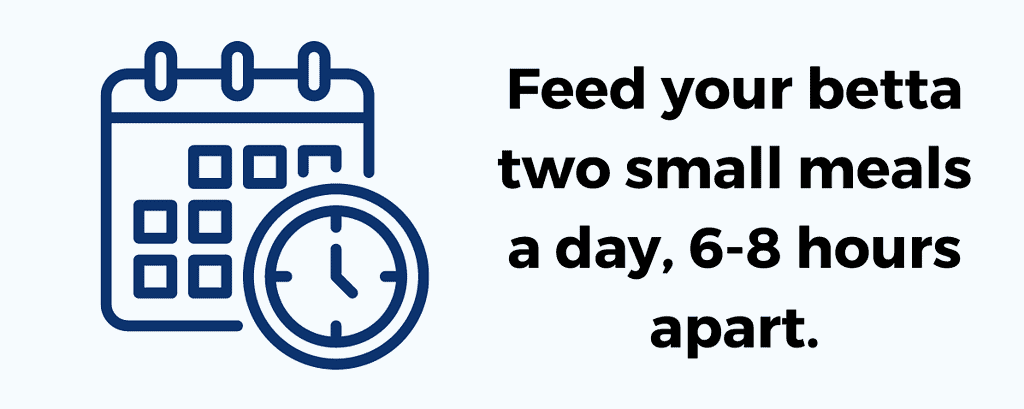
Preventing bloating in betta fish is easier than finding the right treatment methods.
Good fishkeeping practices prevent bloating and keep your betta healthy.
Practice Proper Feeding Techniques and Establish a Schedule
Feed your betta two small meals a day at least 6-8 hours apart.
The smaller meals keep your betta from overeating. A few hours between meals allows for digestion.
Only feed your betta as much as it can eat within 2-3 minutes. This usually amounts to around 2-4 pellets per meal.
Remove leftover food right after feeding time. This prevents harmful bacteria from building up in the water.
Set aside one day every week for fasting your betta. Fasting lets your betta digest any leftover food in its stomach.
Choose the same day for fasting every week and feed your betta around the same times every day.
Establishing a feeding schedule lets your betta know when to expect its next meal.
Supplement your betta’s staple pellet diet with various other foods several times per week.
You may choose live, freeze-dried, or frozen foods. Some good options include:
- Blood worms
- Mysis shrimp
- Daphnia
- Mosquito larvae
These foods give your betta variety in its diet and provide extra nutrients.
Maintain Clean and Healthy Water Conditions
Ideal Water Parameters for a Betta Fish Tank Include the following:
- Temperature: 78-80° degrees Fahrenheit (25.5-27° C)
- pH: 6.5-7.5
- Ammonia and Nitrite: 0 ppm
- Nitrate: < 40 ppm
- gH: 3-4 dGH (50-66.7 ppm)
- kH: 3-5 dKH (53.6-89.4 ppm)
- Minimum Tank Size: 5 Gallons
Maintaining a clean tank prevents bloating caused by bacteria and other toxins.
A dirty tank creates environmental stress for your betta. This stress lowers your betta’s immune system and makes the fish prone to diseases.
Keep your tank clean with partial water changes every week. Aim for removing and replacing only 20% of the water.
Always add a dechlorinator to the new water before adding it to the tank. Chlorine is highly toxic to bettas.
Use a gravel vacuum to remove waste from the substrate. During the water change, remove algae from the sides of the tank with an algae scraper.
An aquarium water testing kit tells you your water’s pH, ammonia, nitrite, and nitrate levels.
Regularly test the tank water and ensure your water parameters are within a safe range for your betta.
Maintain a consistent temperature range of 78-80° degrees Fahrenheit (25.5-27° C) with a tank heater.
A low-current aquarium filter helps circulate the heat and removes harmful bacteria from the water.
Provide a Larger Tank for Your Betta
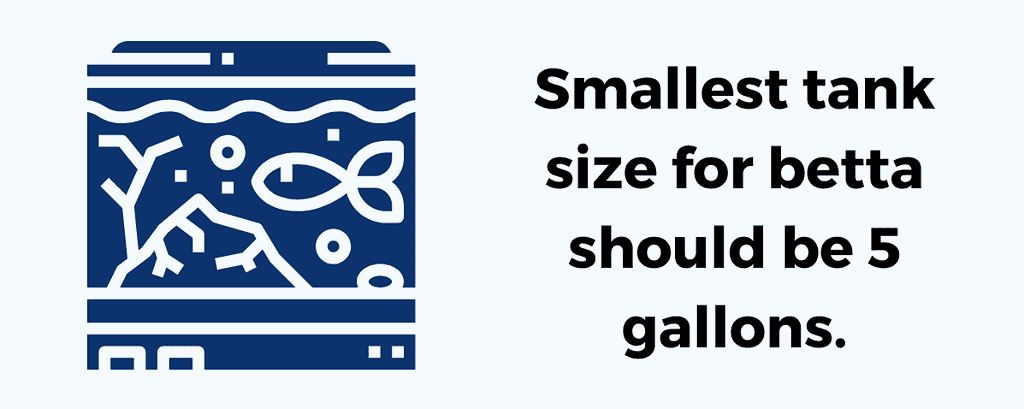
Keeping your betta in a small or overcrowded community tank prevents the fish from exercising.
Without enough exercise, your betta becomes bloated.
The smallest tank size for your betta should be 5 gallons, but a 10-gallon tank offers more room for exploring and swimming.
If you want a community tank setup, I recommend at least a 20-gallon tank.
When you add more tank mates, you get more fish waste.
A larger community tank has more stable water parameters and gives your betta enough space for swimming around.
Regular Check-Ups and Health Screenings for Betta Fish
Whenever your betta displays unusual behavior or you suspect an illness, consult a veterinarian.
Bettas are hardy fish, but some illnesses may be fatal without proper care.
A veterinarian can perform a thorough exam and screen your fish for illnesses.
Beating the Bloat in Betta Fish
Bloating in betta fish can become fatal without prompt treatment.
Begin treatment for bloating at the first sign of symptoms so your betta can fully recover.
Severe cases of bloating need veterinary care right away.
Establishing a healthy feeding routine and maintaining a clean tank goes a long way in preventing most causes of bloat.

